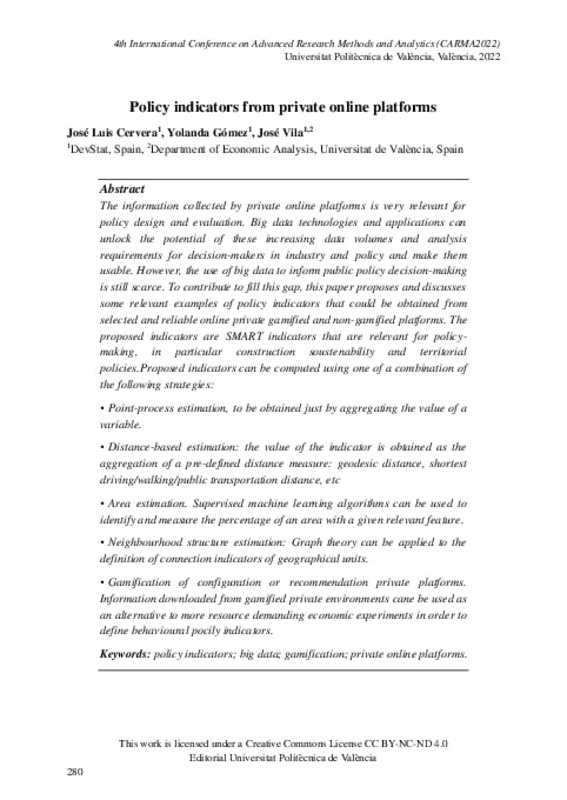JavaScript is disabled for your browser. Some features of this site may not work without it.
Buscar en RiuNet
Listar
Mi cuenta
Estadísticas
Ayuda RiuNet
Admin. UPV
Policy indicators from private online platforms
Mostrar el registro sencillo del ítem
Ficheros en el ítem
| dc.contributor.author | Cervera-Ferri, Jose Luis
|
es_ES |
| dc.contributor.author | Gomez, Yolanda
|
es_ES |
| dc.contributor.author | Vila, José
|
es_ES |
| dc.date.accessioned | 2022-11-14T13:32:07Z | |
| dc.date.available | 2022-11-14T13:32:07Z | |
| dc.date.issued | 2022-09-20 | |
| dc.identifier.isbn | 9788413960180 | |
| dc.identifier.uri | http://hdl.handle.net/10251/189712 | |
| dc.description.abstract | [EN] The information collected by private online platforms is very relevant for policy design and evaluation. Big data technologies and applications can unlock the potential of these increasing data volumes and analysis requirements for decision-makers in industry and policy and make them usable. However, the use of big data to inform public policy decision-making is still scarce. To contribute to fill this gap, this paper proposes and discusses some relevant examples of policy indicators that could be obtained from selected and reliable online private gamified and non-gamified platforms. The proposed indicators are SMART indicators that are relevant for policymaking, in particular construction soustenability and territorial policies.Proposed indicators can be computed using one of a combination of the following strategies: • Point-process estimation, to be obtained just by aggregating the value of a variable. • Distance-based estimation: the value of the indicator is obtained as the aggregation of a pre-defined distance measure: geodesic distance, shortest driving/walking/public transportation distance, etc • Area estimation. Supervised machine learning algorithms can be used to identify and measure the percentage of an area with a given relevant feature. • Neighbourhood structure estimation: Graph theory can be applied to the definition of connection indicators of geographical units. • Gamification of configuration or recommendation private platforms. Information downloaded from gamified private environments cane be used as an alternative to more resource demanding economic experiments in order to define behavioural pocily indicators. | es_ES |
| dc.format.extent | 1 | es_ES |
| dc.language | Inglés | es_ES |
| dc.publisher | Editorial Universitat Politècnica de València | es_ES |
| dc.relation.ispartof | 4th International Conference on Advanced Research Methods and Analytics (CARMA 2022) | |
| dc.rights | Reconocimiento - No comercial - Sin obra derivada (by-nc-nd) | es_ES |
| dc.subject | Policy indicators | es_ES |
| dc.subject | Big Data | es_ES |
| dc.subject | Gamification | es_ES |
| dc.subject | Private online platforms | es_ES |
| dc.title | Policy indicators from private online platforms | es_ES |
| dc.type | Capítulo de libro | es_ES |
| dc.type | Comunicación en congreso | es_ES |
| dc.rights.accessRights | Abierto | es_ES |
| dc.description.bibliographicCitation | Cervera-Ferri, JL.; Gomez, Y.; Vila, J. (2022). Policy indicators from private online platforms. En 4th International Conference on Advanced Research Methods and Analytics (CARMA 2022). Editorial Universitat Politècnica de València. 280-280. http://hdl.handle.net/10251/189712 | es_ES |
| dc.description.accrualMethod | OCS | es_ES |
| dc.relation.conferencename | CARMA 2022 - 4th International Conference on Advanced Research Methods and Analytics | es_ES |
| dc.relation.conferencedate | Junio 29-Julio 01, 2022 | es_ES |
| dc.relation.conferenceplace | Valencia, España | |
| dc.relation.publisherversion | http://ocs.editorial.upv.es/index.php/CARMA/CARMA2022/paper/view/15094 | es_ES |
| dc.description.upvformatpinicio | 280 | es_ES |
| dc.description.upvformatpfin | 280 | es_ES |
| dc.type.version | info:eu-repo/semantics/publishedVersion | es_ES |
| dc.relation.pasarela | OCS\15094 | es_ES |






